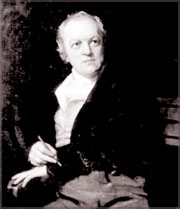William Blake - Imagination over reason
Compiled by Ishara Mudugamuwa
[email protected]
 William
Blake, an English poet, painter and printmaker was born on 28 November
1767, in London, where he spent his entire life, save for the years
between 1800 to 1803, when he lived in a cottage at Felpham, near the
seaside town of Bongnor, in Sussex. William
Blake, an English poet, painter and printmaker was born on 28 November
1767, in London, where he spent his entire life, save for the years
between 1800 to 1803, when he lived in a cottage at Felpham, near the
seaside town of Bongnor, in Sussex.
At the age of fifteen, Blake apprenticed as an engraver, making
plates from which pictures for books were printed. He later went to the
Royal Academy, and at 20, was employed as an engraver to a book seller
and publisher.
When he was 25, he married Catherine Bouchier. They had no children
but were happily married for almost 45 years. In 1784, a year after he
published his first volume of poems, Blake set up his own engraving
business.
Blake illustrated the songs and other works with designs that
demanded an imaginative reading of the dialogue between words and the
picture.
Blake created his illustrations by writing the words and drawing the
pictures for each and every poem on a copper plate.
Blake is one of the major romantic poets, whose verse and artwork
became part of the wider movement of romanticism in late eighteenth and
early nineteenth century European culture.
His writing combines a variety of styles; he is at once an artist, a
lyric poet, a mystic and a visionary, and his work has fascinated,
intrigued and sometimes bewildered readers ever since.
Blake's work can be difficult to interpret at times, mainly because
the reader is offered, Blake's visions in Blake's own terms. Blake draws
on a highly powerful, but essentially personal, mythological system of
his own devise, but one that also draws on a variety of poetic and
philosophical sources.
Blake created a unique form of illustrated verse, His poetry inspired
by mystical vision, is among the most original, lyric and prophetic in
the language. Blake's most popular poems are Songs of Innocence,
eloquent lyrics that make fresh, direct observations.
In 1794, disillusioned with the possibility of human perfection, he
issued Songs of Experience. Both series of poems take on deeper
resonances when read in conjunction. William Blake has been called a
preromantic because he rejected the neoclassical literary style and
modes of thought.
His graphic art also defied 18th century conventions. Always
stressing imagination over reason, he felt that ideal forms should be
constructed not from observations of nature but from inner visions.
William Blake died on 12 August 1827. |
